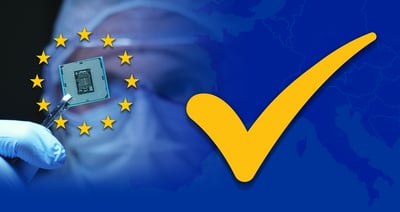Last year, medical device manufacturers across the globe exhaled a sigh of relief when the European Medical Device Regulation (EU MDR) compliance deadline was delayed by one year to May 26, 2021. Amid the pandemic, however, businesses were rocked by a host of unexpected challenges. And for many companies, those 12 months flew by in flash.
Now, despite their best efforts, many medical device manufacturers are still struggling to ensure they are compliance-ready.
At Research Solutions, the most common concerns we hear from the research community center on the expanded requirements for clinical data. Under the EU MDR, any medical device manufacturer that sells its products in Europe must comply with increased data requirements and ongoing clinical evaluation throughout the device's entire lifespan.
Medical device manufacturers must be able to provide enough technical documentation and clinical evidence to prove their safety and performance claims—not only for the pre-market phase of device production, but all the way through post-market surveillance.
This new level of regulatory oversight is a big change from the previous Medical Devices Directive (MDD), which focused more narrowly on the pre-approval phase of device manufacturing.
In practical terms, this means medical device companies will need to discover, collect, and manage a lot more clinical data moving forward.
To avoid failing an audit, companies must make their information procurement and management processes as transparent as possible to the Notified Bodies. In short, an EU MDR-compliant process must be documented, justified, and repeatable.
Better information management is essential for EU MDR compliance
Medical device companies must be able to produce a Clinical Evaluation Plan and a Clinical Evaluation Report (CER) to meet the EU MDR’s pre-market requirements. As part of the expanded oversight, companies must also produce a Post-Market Clinical Follow-up (PMCF) Plan and a PMCF Evaluation Report. It should be noted that the EU MDR establishes more than 15 content elements for the technical documentation on Post-Market Surveillance alone.
For medical device manufacturers, meeting these robust requirements for clinical data and ongoing literature monitoring can feel overwhelming. The good news is that there are tools available to facilitate compliance.
An automated, regulatory-compliant literature review platform, for example, can do a lot of the work for you—faster and with better results. You can conduct systematic reviews, track your processes, and produce CERs that meet the new regulatory standards.
How Research Solutions can assist with compliance
If you need to quickly implement exceptional literature procurement and management processes, we’re here to help. At Research Solutions, we partner with leading software providers to streamline literature reviews and facilitate EU MDR compliance.
For more resources and detailed information on the impending regulatory changes, download this free guide: European Medical Device Regulation - What Is Included and How to Comply.
Karen Hittelman | Lead Copywriter
Karen is a copywriter who specializes in business-to-business (B2B) technology marketing. With more than 14 years of writing experience, she has extensive background in SaaS and cloud-based solutions across a range of industries. Karen has been writing for Research Solutions since 2018, where she serves as an embedded...


